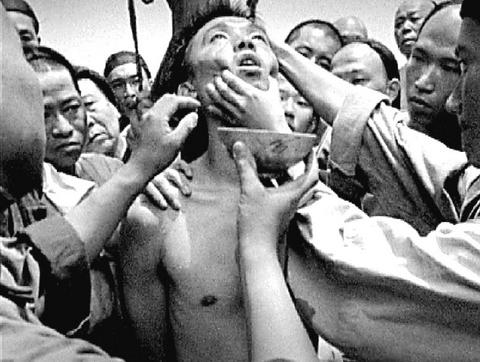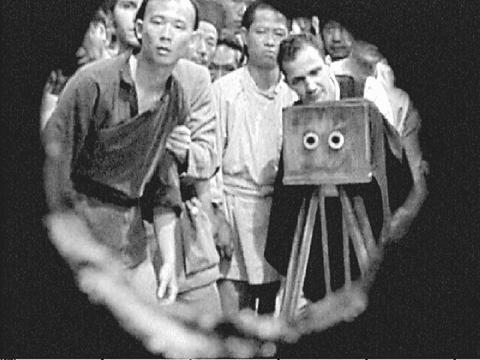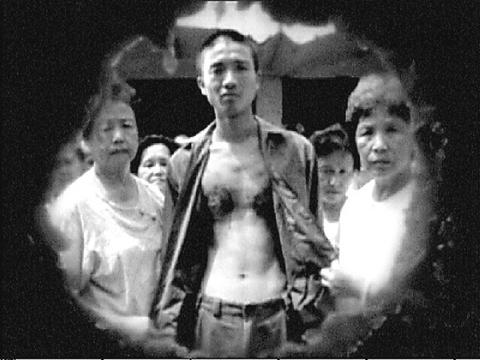The international exhibition of the Taipei Biennial: Great Theatre of the World is currently on view at the Taipei Fine Arts Museum until March 2, 2003. Using the theme of the world as a theatre allows for some reflections for the audience on how we are all actors in this game of life.
One dynamic work that stands out from the rest is the film Lingchi -- Echoes of a Historical Photograph by Taiwanese artist Chen Chieh-jen (陳界仁) who combines a fictive imagining of a real historical event with the current tragedy of local Taiwanese laborers.
Shot using 16mm film and transferred to DVD, the silent black and white movie (approximately 20 minutes long) is beamed onto large screens with three projectors, thus creating an effect that is powerful, mystical, majestic and monumental. At times all three projections are in sync, and at other times the screens show three different images.

COURTESY OF CHEN CHEH-JEH
The film is based on the famous 1905 photograph of a man being punished the Manchu way, by being cut into pieces for the crime of murder. His ecstatic expression is attributed to opium, which was administered to prolong the torture. Philosopher Georges Bataille discussed this photo extensively in his book The Tears of Eros and noted the correlations between the beauty of religious eroticism, divine ecstasy and the shocking horror of cruel torture.
Chen's cinematic close-ups of the victim's face bring to mind images of blissful euphoria, homoeroticism, and religious crucifixion. Slow motion close-ups of a hand holding a knife, the grim expressions of the crowd of ponytailed bystanders, blood dripping down the crowd's legs and flowing into the ground are eerie, but surprisingly not as violent as what one might expect considering Chen's topic. The film is oddly un-sadistic, even though the content is of death by dismemberment.
Interspliced with the staged reenactment of the torture scene are scenes where the camera slowly pans above a crowd of silent women. These women are factory workers in Taoyuan, and due to various tragic events such as occupational hazards or unemployment, they no longer are able to work. Chen links these contemporary women to the 1905 victim. Due to the women's circumstances, which are often beyond their control, they are also suffering a long torture, but without any bliss.

Chen came to international prominence with his large computer images of similar torture scenes. However, this film is a departure from those past works. By linking the historical with the contemporary social and economic situation in Taiwan, Chen has created an extremely powerful work that links the past with the present, the fictive with the documentary. He is also specific to the local situation, while remaining universal.
One irritating drawback to viewing Lingchi is the encroaching cacophony of sounds from other artists' installations, which dramatically shatters the silence of this overwhelmingly poetic work. However, this is not a reason to avoid seeing the work. It's a cinematic experience worth remembering.


On April 26, The Lancet published a letter from two doctors at Taichung-based China Medical University Hospital (CMUH) warning that “Taiwan’s Health Care System is on the Brink of Collapse.” The authors said that “Years of policy inaction and mismanagement of resources have led to the National Health Insurance system operating under unsustainable conditions.” The pushback was immediate. Errors in the paper were quickly identified and publicized, to discredit the authors (the hospital apologized). CNA reported that CMUH said the letter described Taiwan in 2021 as having 62 nurses per 10,000 people, when the correct number was 78 nurses per 10,000

As we live longer, our risk of cognitive impairment is increasing. How can we delay the onset of symptoms? Do we have to give up every indulgence or can small changes make a difference? We asked neurologists for tips on how to keep our brains healthy for life. TAKE CARE OF YOUR HEALTH “All of the sensible things that apply to bodily health apply to brain health,” says Suzanne O’Sullivan, a consultant in neurology at the National Hospital for Neurology and Neurosurgery in London, and the author of The Age of Diagnosis. “When you’re 20, you can get away with absolute

May 5 to May 11 What started out as friction between Taiwanese students at Taichung First High School and a Japanese head cook escalated dramatically over the first two weeks of May 1927. It began on April 30 when the cook’s wife knew that lotus starch used in that night’s dinner had rat feces in it, but failed to inform staff until the meal was already prepared. The students believed that her silence was intentional, and filed a complaint. The school’s Japanese administrators sided with the cook’s family, dismissing the students as troublemakers and clamping down on their freedoms — with

As Donald Trump’s executive order in March led to the shuttering of Voice of America (VOA) — the global broadcaster whose roots date back to the fight against Nazi propaganda — he quickly attracted support from figures not used to aligning themselves with any US administration. Trump had ordered the US Agency for Global Media, the federal agency that funds VOA and other groups promoting independent journalism overseas, to be “eliminated to the maximum extent consistent with applicable law.” The decision suddenly halted programming in 49 languages to more than 425 million people. In Moscow, Margarita Simonyan, the hardline editor-in-chief of the